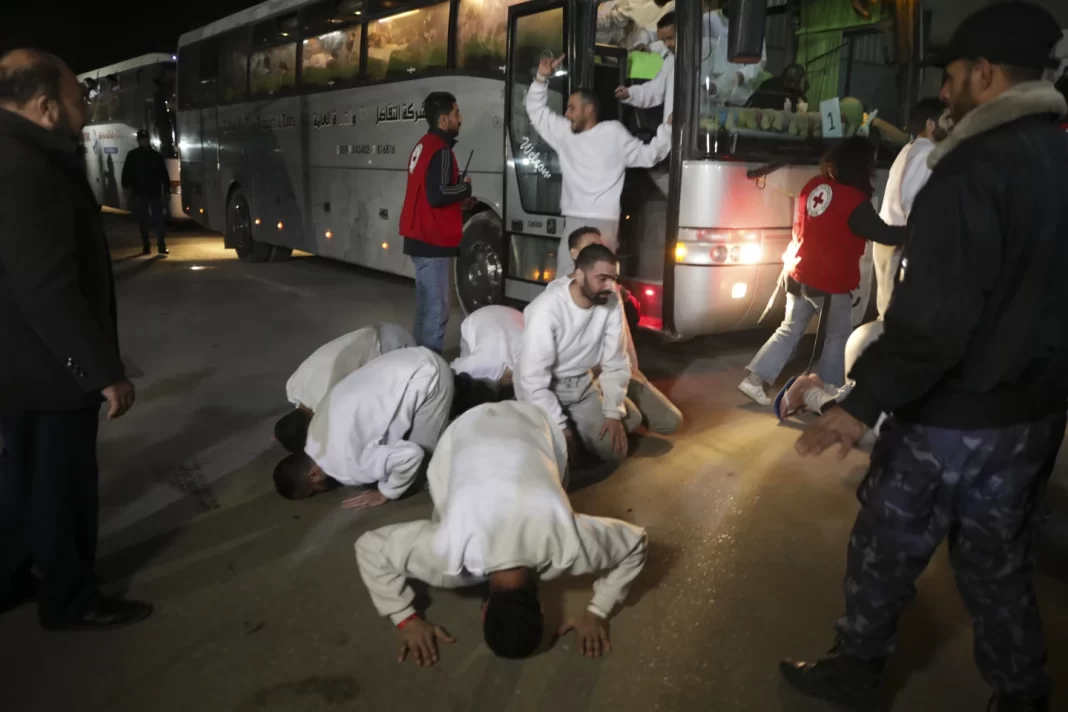By Mohammad Jahjouh, Wafaa Shurafa and Natalie Melzer
Israel will not withdraw from a strategic corridor in the Gaza Strip as called for by the ceasefire, an official said Thursday, a refusal that could spark a crisis with Hamas and key mediator Egypt at a sensitive moment for the fragile truce.
Hours earlier, Hamas released the remains of four hostages in exchange for over 600 Palestinian prisoners, the last planned swap of the ceasefire’s first phase, which ends this weekend. Talks over the second and more difficult stage have yet to begin.
Much could hinge on a visit by U.S. President Donald Trump’s Mideast envoy, Steve Witkoff, who is expected in the region in the coming days. Witkoff has said he wants the sides to move into negotiations on the second phase, which were supposed to begin the first week of February.
Hamas said Thursday it was ready to negotiate the next phase.
Israeli Prime Minister Benjamin Netanyahu said in a brief statement that he was sending negotiators to Cairo, without providing further details.
The Israeli official, speaking on condition of anonymity in line with regulations, said the army needed to remain in the so-called Philadelphi corridor, on the Gaza side of the border with Egypt, to prevent weapons smuggling.
Separately, Defense Minister Israel Katz said at a meeting with local leaders that he had seen tunnels penetrating the border on a recent visit to the corridor, without providing evidence or elaborating on Israel’s plans. Egypt says it destroyed the smuggling tunnels from its side years ago and set up a military buffer zone to halt smuggling.
Hamas said any Israeli attempt to maintain a buffer zone in the corridor would be a “blatant violation” of the ceasefire agreement. The militant group says that sticking to the agreement is the only way for Israel to secure the release of dozens of hostages still held in Gaza.
Israel is supposed to begin withdrawing from the Philadelphi corridor on Saturday, the last day of the first phase, and complete it within eight days. There was no immediate comment from Egypt, which is opposed to any Israeli presence on the Gaza side of its border.
The remains released Thursday were confirmed to be those of Ohad Yahalomi, Itzhak Elgarat, Shlomo Mantzur and Tsachi Idan, according to the Hostages and Missing Families Forum, which represents families of the captives.
Mantzur, 85, was killed in Hamas’ Oct. 7, 2023, attack that triggered the war, and his body was taken into the territory. Israel said the other three were killed in captivity, without elaborating.
“Our hearts ache upon receiving the bitter news,” Israeli President Isaac Herzog said. “In this painful moment, there is some solace in knowing that they will be laid to rest in dignity in Israel.”
French President Emmanuel Macron said he shared the “immense pain” of the family and loved ones of Yahalomi, who had French citizenship.
Hamas confirmed that over 600 prisoners had been released overnight. Most were detainees returned to Gaza, where they had been rounded up after the Oct. 7 attack and held without charge on security suspicions.
Dozens of Palestinian teenagers as well as women detained by Israel in Gaza were released Thursday back to hugs and tears from their loved ones.
The teenagers looked gaunt and skinny as they disembarked from Red Cross buses in the southern town of Khan Younis. Many fell into the arms of relatives, who spent days waiting for them after Israel held up their release last weekend to protest what it called cruel treatment of hostages by Hamas during their releases. Women cried and hugged the boys.
The Palestinian prisoners club, a group representing current and former prisoners, said those released into Gaza Thursday were 44 male teenagers aged 15-19 and two women.
In a separate prisoner release overnight, some fell to their knees in gratitude after disembarking in Khan Younis. In the West Bank town of Beitunia, dozens of prisoners were welcomed by crowds of relatives and well-wishers.
Israel had delayed the release of the prisoners on Saturday over Hamas’ practice of parading hostages before crowds and cameras during their release. Israel, along with the Red Cross and U.N. officials, have called the ceremonies humiliating for the hostages.
Hamas released the four bodies to the Red Cross in Gaza overnight without a public ceremony.
The prisoners released Thursday included 445 men, 21 teenagers and one woman, according to lists shared by Palestinian officials that did not specify their ages. Only around 50 Palestinians were released into the occupied West Bank and east Jerusalem in this round, while dozens sentenced to life over deadly attacks against Israelis were exiled.
AP

